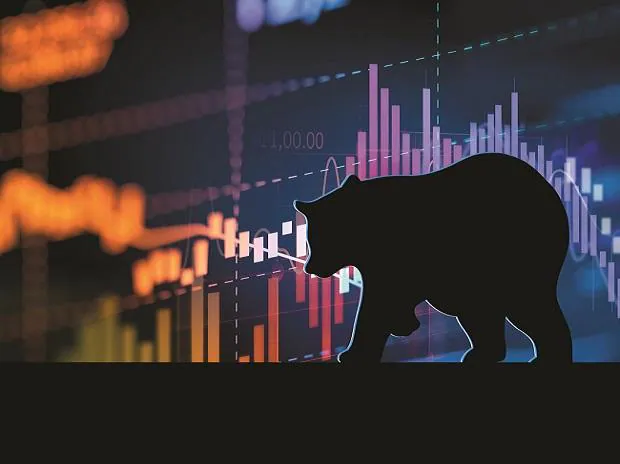[ad_1]
Five months into calendar year 2022, equity markets still continue to be on slippery ground. June, too, has begun on a volatile note as investors tread cautiously amid soaring inflation and rising rates. On Friday, the markets lost ground with the S&P BSE Sensex and Nifty 50 indices sinking up to 1.8 per cent each and eroding around Rs 3.2 lakh crores of investor wealth, showed data on BSE.
A day after ending on a positive note, the Sensex dropped 1,017 points and the Nifty slipped 284 points to close at 16,193 level on Friday.
The market’s confidence has been shaken as persistently elevated levels of commodity prices, and disrupted supply chains around the world continue to be a double whammy for the economy and companies alike, analysts said.
ALSO READ: Market correction insufficient and pressure to continue, says Nomura
“Strengthening of the US 10-year bond yield to 3.05 per cent can be interpreted as the market discounting worse-than-expected inflation data in the US on Friday. If inflation data turns out to be worse-than-expected, equity markets will turn bearish. If it doesn’t, markets will stage a rebound next week. Calibrated buying on dips in high quality banking and IT stocks can fetch good returns to investors in the medium- term,” said V K Vijayakumar, chief investment strategist at Geojit Financial Services.
Let’s closely look at the factors that tanked the domestic equity markets on Friday:
Global markets plunge: US markets sharply dropped overnight as inventors anticipated a rise in inflation, which may prod the US Federal Reserve (US Fed) to get even more aggressive with rate hikes. Investors worry that consequently, a recession remains on the cards. Besides, the Fed’s rate-setting committee will meet next week, where it will likely deliver another rate hike of 50-bps.
Most Asian markets also fell on Friday as China’s producer price index and consumer inflation rose 6.4 per cent and 2.1 per cent, respectively, from a year ago. These were, however, in line with market’s expectations.
ECB signals first rate hike in a decade: The European Central Bank (ECB) on Thursday announced that it would take a 25 bps rate hike at its next meeting in July. This would be the first increase in interest rates in around 10 years.
ALSO READ: Chris Wood rejigs India equity exposure; replaces HDFC with HDFC Bank
Further, the bank expects a further hike at the September meeting as well. It also downgraded the growth forecast to 2.8 per cent for 2022, and raised the inflation estimate to 6.8 per cent from 5.1 per cent projected in March.
Return of lockdown in Shanghai: China’s business hub Shanghai has again been put under restrictions just after the city-wide lockdown was lifted on June 1. The reimposition of a lockdown in the major Chinese city is weighing on markets, as likely supply disruptions threaten India Inc’s profitability prospects.
India’s rising Covid-19 tally: A fresh uptick in Covid-19 cases across the country, especially in Maharashtra, has made market participants nervous as any possible restrictions may derail the economic recovery. India has been reporting over 7000 cases since Wednesday, the highest after January. A total of 7,584 cases were reported today.
Surging crude and weaker rupee: Oil prices have sustainably stayed above the $120 a barrel mark for some time now. This, coupled with, a weaker rupee poses a major threat to India’s already widening current account deficit. Brent was trading at $122/bbl, while the rupee touched a new low of 77.82 to a dollar in today’s trade. Moreover, a depreciating rupee can further dampen foreign investors’ confidence, which are already on a withdrawal spree from Indian equities.
 Dear Reader,
Dear Reader,
Business Standard has always strived hard to provide up-to-date information and commentary on developments that are of interest to you and have wider political and economic implications for the country and the world. Your encouragement and constant feedback on how to improve our offering have only made our resolve and commitment to these ideals stronger. Even during these difficult times arising out of Covid-19, we continue to remain committed to keeping you informed and updated with credible news, authoritative views and incisive commentary on topical issues of relevance.
We, however, have a request.
As we battle the economic impact of the pandemic, we need your support even more, so that we can continue to offer you more quality content. Our subscription model has seen an encouraging response from many of you, who have subscribed to our online content. More subscription to our online content can only help us achieve the goals of offering you even better and more relevant content. We believe in free, fair and credible journalism. Your support through more subscriptions can help us practise the journalism to which we are committed.
Support quality journalism and subscribe to Business Standard.
Digital Editor
[ad_2]
Source link

 Dear Reader,
Dear Reader,